NABH Accreditation Process for Hospitals

Quick Summary
- Accreditation is considered the most effective method for enhancing hospital quality, improving their ability to provide high-quality care and ensuring patient safety.
- NABH accreditation encourages public and private healthcare organizations to fulfil their roles in the health system.
- NABH accredits healthcare organizations regardless of ownership, legal status, or size.
The healthcare industry in India is undergoing rapid social, economic, and technological changes. Accreditation is considered the most effective method for enhancing hospital quality, improving their ability to provide high-quality care and ensuring patient safety.
NABH accreditation encourages public and private healthcare organizations to fulfil their roles in the health system. It accredits healthcare organizations regardless of ownership, legal status, or size. Read the blog to know more about the accreditation process.
What is NABH?
Hospitals and healthcare organizations should ensure that patients, staff, and other stakeholders are safe. The government, NGOs, insurance agencies, professional organizations, and patients are concerned about the quality and safety of healthcare services.
The Quality Council of India (QCI) established NABH to provide accreditation services to healthcare organizations. NABH full form in medical is National Accreditation Board for Hospitals and Healthcare Providers.
Its primary objective is to promote continuous improvement and patient safety in healthcare systems. Additionally, NABH provides international recognition to accredited hospitals and promotes medical tourism in the country.


What is NABH Accreditation?
The NABH hospital accreditation program was launched in 2005 to enhance the quality of healthcare and safety for patients in both public and private hospitals. The program has since grown and gained international recognition, with standards equivalent to other global healthcare accreditation programs.
NABH accreditation is a seal of approval that signifies that a healthcare provider has met certain quality and safety standards in its services, infrastructure, and management.
This voluntary accreditation helps patients make informed choices while selecting a healthcare provider. It also promotes continuous improvement in healthcare services to strive for continuous excellence.
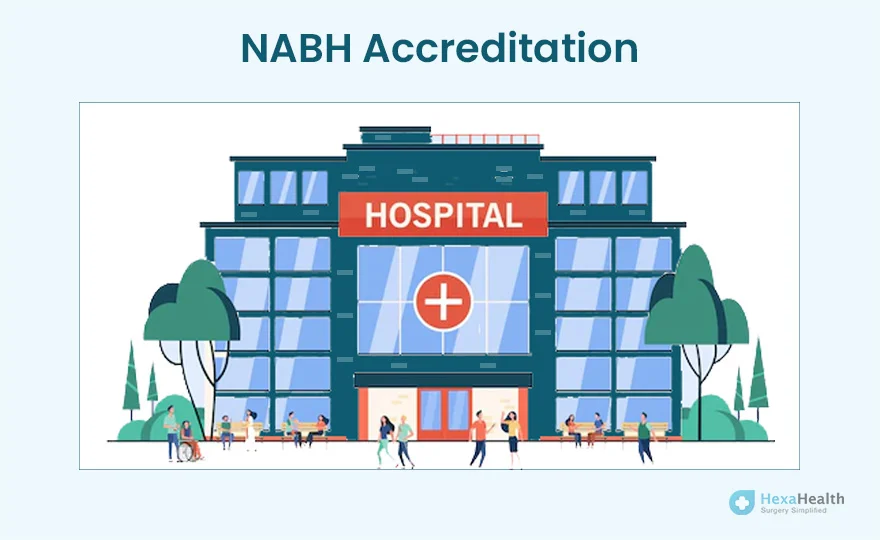
Key Features of NABH Accreditation
NABH Accreditation is a certificate that healthcare providers can earn by meeting certain quality standards. It helps them identify areas to improve while giving patients the needed information to choose the best healthcare provider. The key features of NABH Certification are:
- Certification: NABH Accreditation provides a certificate to the healthcare organisation. It signifies quality and safety standards in its services, infrastructure, and management.
- Focus on Patient Safety: It ensures that the healthcare provider follows Standard Operating Procedures (SOPs) for patient care, treatment, and management and focuses on patient safety, rights, and satisfaction.
- Voluntary Process: The accreditation process is voluntary and requires healthcare providers to implement continuous quality improvement practices.
- Informed Decision Making: NABH Accreditation provides patients with a tool to make informed decisions about choosing a healthcare provider.
- Continuous Improvement: It helps healthcare providers benchmark their performance and promotes a culture of continuous improvement in healthcare services.
- Validity: The accreditation is valid for two years, and healthcare providers must undergo re-accreditation to maintain their accreditation status.
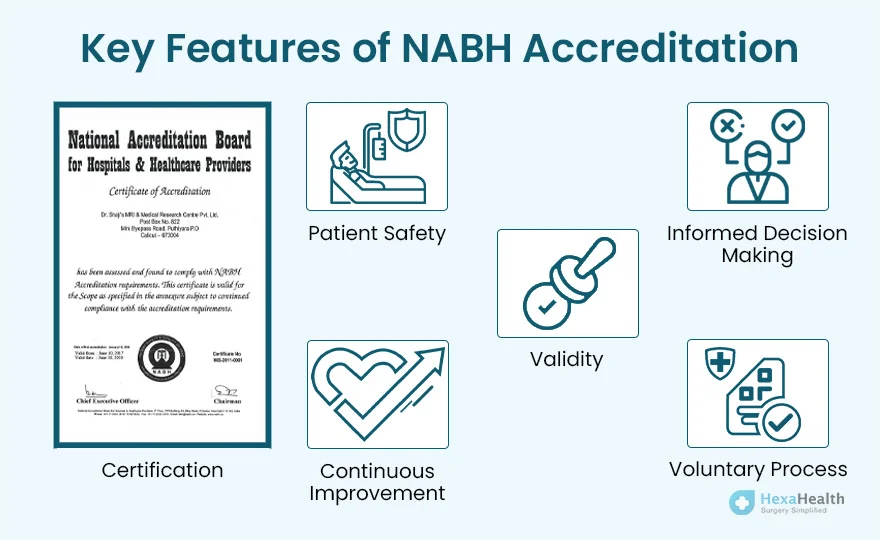
Benefits of NABH Accreditation
The benefits of NABH Accreditation are not limited to the patients, the healthcare organisation, the staff, and regulatory bodies.
Accreditation encourages healthcare providers to continuously improve their services, resulting in better patient outcomes and an overall improvement in healthcare quality.
Benefits of NABH Accreditation for Patients
- Patient-Centred: Patients are the primary focus and benefit most from NABH Accreditation.
- High-Quality Care: Accreditation requires healthcare providers to follow standardised processes and best practices. It ensures consistent and high-quality care delivery and reduces the risk of errors or adverse events.
- Patient Safety: This includes specific risk management and patient safety standards. Healthcare providers identify and mitigate risks, improving overall patient and staff safety.
- Protected Rights: Patients' rights are protected by assisting them in making informed decisions about their care.
- Patient Satisfaction: The NABH-accredited healthcare organisation regularly evaluates patient satisfaction, which helps improve the healthcare management standard.
 Benefits of NABH Accreditation for Healthcare Organisations
Benefits of NABH Accreditation for Healthcare Organisations
- Continuous Improvement: NABH-accredited hospitals stimulate the constant improvement of patient services.
- Quality Care: The accreditation ensures that hospitals meet specific standards related to patient care, safety, and outcomes, resulting in improved quality of care for patients.
- Enhanced Credibility: Hospitals with accreditation are widely recognised as a mark of quality and excellence in healthcare. Thereby improving the credibility and reputation of hospitals among patients, staff, and other stakeholders.
- Competitive Healthcare: The NABH accreditation process helps hospitals identify improvement areas and implement best practices, leading to increased efficiency and better use of resources.
- Medical Tourism: When the standards are certified, it gives international recognition, which helps to promote medical tourism.
 Benefits of NABH Accreditation for Staff
Benefits of NABH Accreditation for Staff
- Improved Work Environment: NABH Accreditation promotes a culture of safety, quality, and continuous improvement in the workplace, leading to an improved work environment for staff.
- Enhanced Professional Development: Accreditation requires healthcare providers to implement training programs for staff to improve their skills and knowledge, leading to professional development opportunities.
- Higher Staff Satisfaction: It focuses on patient safety and satisfaction, resulting in higher staff satisfaction levels as they provide better patient care.
- Recognition and Rewards: The staff who meet or exceed standards are recognised and rewarded, boosting their morale and motivation to provide high-quality care.
- Job Security: Accredited healthcare providers are more likely to attract and retain skilled staff, increasing employee job security.
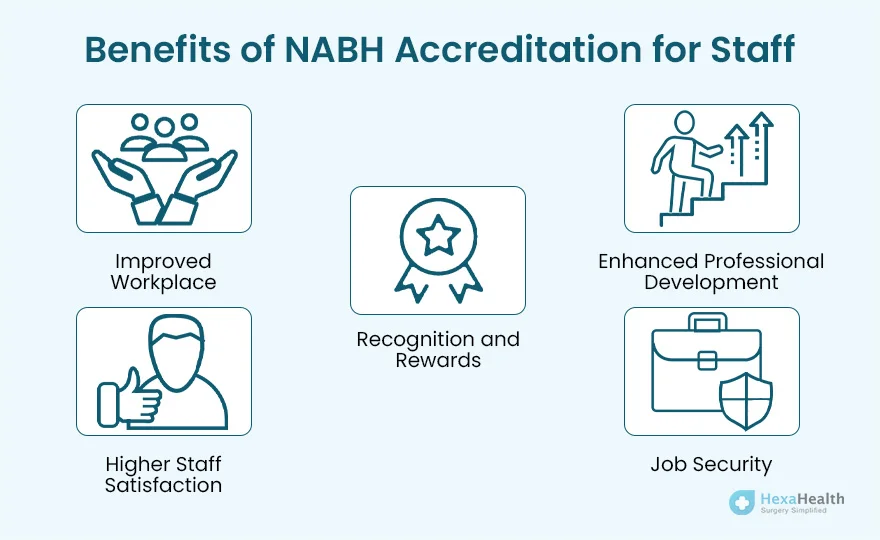
NABH Accreditation Program
NABH operates several accreditation programs. It includes:
- Hospitals: NABH standards ensure high-quality care, safety, and patient satisfaction in hospitals of all sizes and ownerships.
- Small Healthcare Organizations (SHO): The standards provide a roadmap for standardisation to hospitals and nursing homes with a bed capacity of up to 50 beds.
- Blood Banks: Compliance with safety and quality protocols is ensured at blood centres.
- Medical Imaging Services (MIS): NABH provides guidelines for delivering quality diagnostic and interventional imaging services.
- Dental Facilities: Patient safety, care quality, staff training, and knowledge updating in response to dental services are the main focus.
- Allopathic Clinics: The requirements align with hospital standards to ensure quality assurance in allopathic clinics.
- Medical Laboratory Services: High-quality and safe practices must be followed, from sample collection to reporting results.
- AYUSH Hospitals: These standards ensure safe and effective traditional and alternative treatments in AYUSH hospitals.
- Primary Health Centre (PHC): Simple and applicable quality assurance criteria are established to improve primary healthcare facilities.
- Clinical Trial (Ethics Committee): The established norms must be followed to increase the safety of clinical trials in India.
- Panchakarma Clinics: Authorised Panchakarma clinics adhere to nationally recognised quality and safety standards.
- Eye Care Organisation: Accreditation raises the standard and safety of eye treatment for patients and enhances service quality in critical situations.
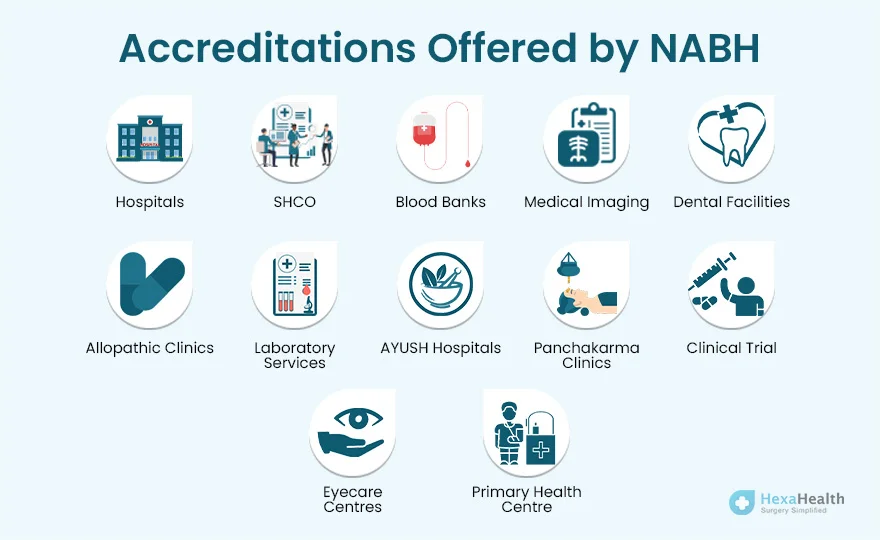
NABH Accreditation Process
The process of NABH accreditation can be lengthy and demanding, but it is a prestigious recognition. It helps healthcare providers stand out in a competitive market. The NABH Accreditation process is as follows:
- Application for Accreditation: To apply for NABH accreditation, a healthcare organization (HCO) must submit an application form and pay an application fee, providing accurate information about their services and other necessary details.
- Registration of Application: After the NABH Secretariat receives the completed application form, necessary documents, and fees from the HCO, they will acknowledge the receipt of the application.
- Appointment of Principal Assessor: The primary assessor is responsible for both the pre-assessment and on-site assessment of the HCO and will have overall responsibility for conducting the evaluation.
- Pre-Assessment: The HCO must conduct a self-assessment and internal audit to ensure its readiness before the pre-assessment. This must be completed within three months of applying.
- Assessment: After the HCO has addressed any deficiencies, NABH will propose an assessment team for the final assessment, which must be completed within six months of the pre-assessment visit.
- Scrutiny of Assessment Report: NABH will review the assessment report and communicate the results to the HCO, ensuring that any non-conformities raised by the assessment team are available to and understood by the HCO.
- Accreditation Committee: Once the HCO has taken satisfactory corrective action, the NABH officer will prepare a summary of all relevant information gathered during the application processing, assessment report, and any additional information provided by the HCO.
- Issue of Accreditation Certificate: If the recommendation for accreditation is approved, the NABH officer will issue the accreditation certificate to the organization.
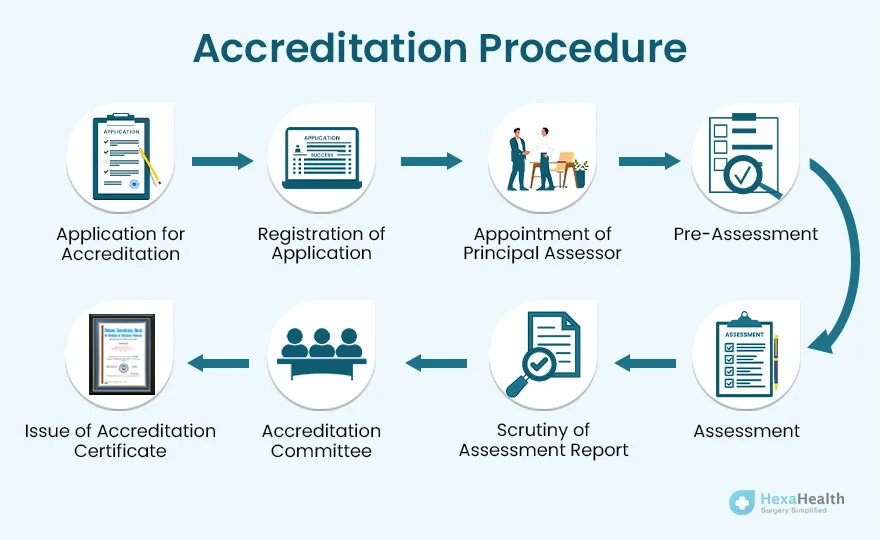
Summing It Up!
NABH accreditation offers several benefits to hospitals and other healthcare organisations. Not only does it systemise the processes in the hospital, but it also boosts patients’ confidence in the facilities and services offered. A certificate of accreditation by NABH can help healthcare centres gain recognition internationally.
If you have any concerns or questions about the accreditation process, consult an expert at HexaHealth TODAY! The team of professionals at HexaHealth will be happy to assist you.
Suggested Reads
To read more on CGHS and ECHS, visit the following links:
Frequently Asked Questions
What is the process of NABH accreditation?
NABH full form is National Accreditation Board for Hospitals & Healthcare Providers. NABH accreditation is a seven-step process, which is as follows:
- Application submission to NABH
- Review of application by NABH
- Pre-assessment
- Final assessment
- Review of assesthe sment report
- Approval
- Issue of accreditation certificate
How do hospitals get NABH accreditation?
Why is NABH required?
NABH accreditation enables healthcare organisations to demonstrate commitment to patient safety and quality care. Moreover, it increases patient confidence in the hospital by offering credentialed and trained medical staff services.
The accreditation exhibits excellence in safe and secure healthcare services. Both domestic and foreign tourists looking for health services will prefer hospitals that are NABH-accredited.
What is the NABH certificate?
The NABH certificate is a recognition given to healthcare organizations in India that have met the standards set by the National Accreditation Board for Hospitals & Healthcare Providers (NABH) for quality healthcare delivery.
It assures patients that the organization follows internationally accepted protocols and guidelines, providing safe and reliable healthcare services.
What are the benefits of NABH hospital?
NABH offers various benefits to a hospital, some of which include:
- NABH hospitals ensure patient safety by following strict quality and safety standards.
- Patients at NABH-accredited hospitals may experience better healthcare outcomes.
- NABH accreditation increases patient satisfaction by demonstrating a commitment to meeting patient needs and expectations.
Is NABH a government body?
When did NABH start in India?
What is a NABH audit in a hospital?
What is the difference between NABH and non-NABH?
NABH is a national accreditation body that sets standards for healthcare organizations and assesses them on various parameters to ensure quality and safety of care.
Non-NABH healthcare organizations may have yet to meet these standards and may not be subject to the same level of scrutiny and assessment.
How can I prepare for the NABH inspection?
What is a quality indicator checklist?
Quality indicators are standardised measures of healthcare quality. It measures and tracks a hospital's clinical performance and outcomes.
NABH expects aspirant hospitals to calculate the quality indicators and use the checklist to monitor healthcare quality. There is a list of 70+ quality indicators that aspirant hospitals must monitor to prepare for accreditation.
Last Updated on: 10 March 2023
Reviewer

Dr. Aman Priya Khanna
MBBS, DNB General Surgery, Fellowship in Minimal Access Surgery, FIAGES
14 Years Experience
Dr Aman Priya Khanna is a well-known General Surgeon, Proctologist and Bariatric Surgeon currently associated with HealthFort Clinic, Health First Multispecialty Clinic in Delhi. He has 14 years of experience in General Surgery, Proctolo...View More
Author

She has extensive experience in content and regulatory writing with reputed organisations like Sun Pharmaceuticals and Innodata. Skilled in SEO and passionate about creating informative and engaging medical conten...View More



 Open In App
Open In App